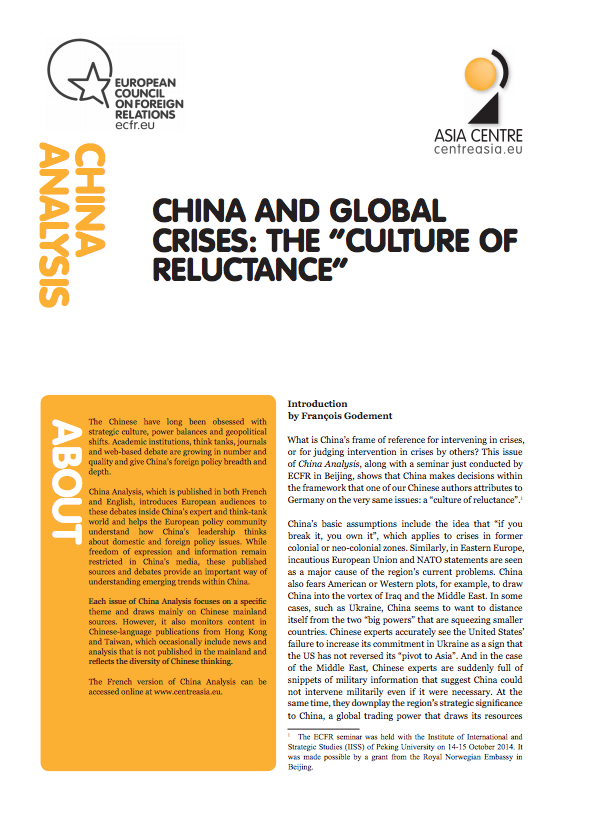China and Global Crises: The “Culture of Reluctance”
Western hopes that China will take greater responsibility for dealing with international crises likely to be dashed
Western hopes that China will take greater responsibility for dealing with international crises are likely to be dashed, according to the latest issue of China Analysis published by the European Council on Foreign Relations and the Asia Centre. The paper concludes that China’s ‘Culture of Reluctance’ – a term borrowed from German foreign policy – will continue to prevent it from becoming a ‘responsible stakeholder’. It will contribute to solving international problems only when its core national interests are directly threatened and it is unable to be a “free rider”.
This policy paper examines Chinese attitudes to Afghanistan, Iraq, Mali, Pakistan and Ukraine, outlining China’s deep suspicion of other powers’ ulterior motives for involvement. It shows how Chinese analysts see the United States plotting to draw it into the vortex of Iraq and the Middle East.
Earlier this year President Obama’s charge that China had been a “free rider” in international affairs for the past thirty years was met with an acerbic response from Beijing which accused the United States in Iraq of being both an ‘invader’ and a ‘deserter’ while China had been a ‘peacekeeper’ a ‘cooperator’ and a ‘rebuilder’.
The joint ECFR and Asia Centre paper concludes that China is highly selective about where it gets involved. Its global engagement is motivated by a desire to protect its own interests and improve its international image.
It also suggests:
- China will have to become non-militarily involved in the Afghan peace process because US and European troop withdrawal could impact security in the neighbouring province of Xinjiang. This could facilitate terrorism and a “drug economy” inside China’s borders as well as threatening the security of China’s investment in extractive industries and infrastructure projects in Afghanistan.
- The threat from Islamic terrorism prompted Beijing to contribute troops to the UN peacekeeping operation in Mali to protect its investments in the region.
- Pakistan is of huge strategic and economic importance to China and military and trade relations have been close for more than six decades. However, despite increased anti-terrorism cooperation, the creation of an economic corridor giving China access to the Arabian Sea and Indian Ocean is hampered by the uncertain security situation.
- While it is still difficult to reach a full assessment of the impact of the Ukraine crisis, some analysts believe China’s economy will benefit from the implementation of European and US sanctions against Russia.
In his introduction to the analysis, Francois Godement, Director of ECFR’s China and Asia programme comments: “China has interests rather than friends and these interests suggest above all the need to exercise caution. The overall picture that emerges is of a China that is too restrained to act as a great power, and that decides its involvement on a highly selective case-by-case basis. Perhaps most importantly, it reserves its hard power strength for China’s immediate neighbourhood.”
The European Council on Foreign Relations does not take collective positions. ECFR publications only represent the views of their individual authors.



